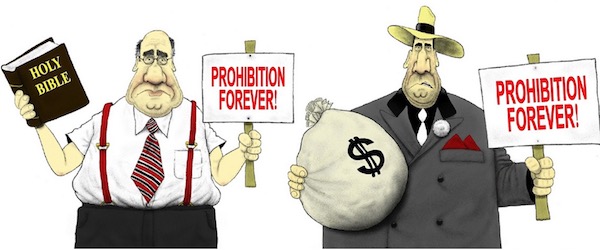Bootleggers and Baptists Agree: Restrict Trade with China
When the President and Congress consider trade legislation, a wide range of interest groups gather to advance their agendas. These agendas are not always obvious, and sometimes corporate and union interests misdirect the public about their motivations.
• Unions want to protect union jobs in the U.S., and extract revenues for retraining workers displaced by imports. Here is the AFLCIO’s page on why it opposes the TPP (Trans-Pacific Partnership for Free Trade), a trade agreement Congress long considered, before it was blocked by the new Administration).
• Environmental organizations work to add their environmental goals to trade agreements. Here is the Sierra Club’s page opposing the TPP (and other “dangerous trade agreements”). This page includes a Sierra Club video with claims against the TPP, including the claim that allowing exports of coal and natural gas from the U.S. would be dangerous.
• Human rights and women’s rights groups advocate trade restrictions to pressure China and other countries to reform. Here is a 2013 article focused on China: “China: The West Needs to Promote Both Trade and Human Rights.” The article notes the danger of mixing rights advocacy with trade policy:
Some, both in Europe and the U.S., are demanding a much tougher approach towards China, including the imposition of punitive sanctions and high import tariffs. But this is undeniably motivated more by a desire to protect vested domestic economic interests, rather than as a way to put political pressure on the Chinese government. Crucially, such an approach risks fueling the perception that the voicing of human rights concerns is only used as a means of criticism in order to justify protectionist measures against China.
• Christian groups consider trade policy a way to pressure China’s government to increase religious freedom. Robert Sirico, in a 1998 Cato Trade Briefing Paper notes:
The freedom of Americans to trade and invest abroad is being challenged in the name of promoting human rights. Conservative Christian activists and others seek to impose trade sanctions against nations that do not protect human rights. Proposed sanctions include the Freedom from Religious Persecution Act and the revoking of China’s Most Favored Nation status.
…..
Climate negotiations offer an illustration of the problem, explained in this PERC page and paper. Though from 1998, the lessons apply to current trade policy issues with China:
As nations argue over global warming policies, PERC economist Bruce Yandle brings fresh insights to the discussion. In “Bootleggers, Baptists, and Global Warming,” a new paper from PERC, Yandle sheds light on puzzling features of the international negotiations over climate change.
Yandle looks at the post-Kyoto negotiations in the light of a theory that he has coined as the “bootleggers and Baptists” theory of regulation. Yandle points out that in the South, Sunday closing laws make it illegal to sell alcohol on Sunday. These laws are maintained by an inadvertent coalition of bootleggers and Baptists. The Baptists (and other religious denominations) provide the public outcry against liquor on Sunday, while the bootleggers (who actually sell liquor on Sunday) quietly persuade legislatures and town councils to maintain the closing laws.
Here similar story “Bootleggers, Baptists and e-cigarettes” (R Street, Jan. 14, 2016)

In all the above stories of special interests and trade policy, we shouldn’t impute bad motives to most of the people and organizations involved. People see the world through their own interests and often persuade themselves that policies they benefit from also benefit the world.
There are people and organization who know policies they benefit from personally and as interest groups will raise costs and limit freedoms for others. Debaters should be alert to see the bootleggers behind various proposed restrictions on trade with China.
